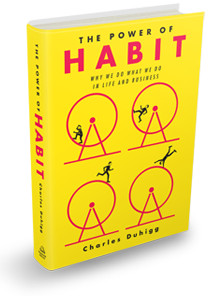 Have you ever gotten into the car to go to destination A and a few turns later realized you’re going to destination B and have to turn around?
Have you ever gotten into the car to go to destination A and a few turns later realized you’re going to destination B and have to turn around?
If so, you’ve experienced the power of habit.
Have you ever told yourself you will NOT eat the cookies sitting out on the counter and two minutes later pick one up and eat it? Or perhaps it was the cigarette. Or the drink.
Habit.
Did you know that the genius behind the methods of Tony Dungy–the only coach in the NFL history to reach the play-offs ten years in a row and the one who turned a troubled Colts team around and three years later took them to win the Super Bowl in 2007–was to teach his players to be faster than everyone else. But they wouldn’t be faster because they would focus on increasing their physical speed. They would be faster because they would learn habits that would make their moves instinct. When his strategy worked, Dungy’s players could move with a speed that was impossible to overcome.
According to some research, more than 40% of the actions we perform each day are not actual decisions, but habits. And habits that we didn’t always consciously choose to start. We have sleeping habits, shopping habits, exercise habits, eating habits. Habits at work, at home, at school. Habits of the mind.
Companies have a huge interest in changing our shopping habits. Coaches have an interest in changing the habits we use when we play. Teachers have an interest in the habits of their classroom. Families and communities have habitual ways of interacting. We all have personal habits we’d like to adopt and others we’d like to give away. But unless you know what you’re doing, habits can be extremely intransigent and slippery things.
The good news is that a lot of research has been done in the last few decades, and we now know how habits work. When we arm ourselves with this knowledge, we’ll have a much better chance of changing. Luckily for us, we don’t have to track all that information down. In The Power of Habit: Why We Do What We Do In Life and Business, Charles Duhigg draws on hundreds of academic studies, interviews with more than three hundred scientists and executives, and research conducted at dozens of companies in his book and distills all this knowledge to its essence.
The title might sound boring, but Duhigg follows the style of Malcom Gladwell (Outliers, Blink, The Tipping Point), and the Heath brothers (Made to Stick), and has written a book that I couldn’t put down. For example, I couldn’t stop reading about coach Tony Dungy, or Target as it predicts who is pregnant and how far along they are, or the scientists who couldn’t figure out why Alcoholics Anonymous works, or how bad organizational habits led to thirty-one people being burned alive in London’s King’s Cross subway stop. I couldn’t stop reading about why Rosa Parks, not the first African American to refuse to give up her bus seat, could pivot the civil rights movement. I couldn’t stop reading the stories of individuals losing bad habits, others picking up good ones, and others who lost their minds but not their habits. Duhigg uses these and many other examples and studies to illustrate the key principles underlying how habits work. In the appendix, he gives us a guide for examining and forming our own habits.
I personally know the power of changing habits of the mind (which I’ve already written about). And teeth. A few years ago, I flossed once a week. It was such a pain. Now it’s a habit that I almost crave each night. I look back at how I made those changes and see it all laid out in Duhigg’s book. Can I actually change my habit of going to bed late? Stay tuned.
If you’re interested in forming the habits of a class, team, company, or family; if you want to change some of your own habits; if you’re interested in knowing why we do what we do and enjoy the style of Malcom Gladwell and Dan and Chip Heath, then I think you’ll love this book. Let me suggest you watch the video below. Then go to http://charlesduhigg.com/the-power-of-habit/ and click on the “Additional Resources” to watch and read more. Then just get the dang book.















I love Tony Dungy, but I have to say that running drills in order to make players react faster has been a part of football for . . . well, ever. The biggest difference between his success as compared to the success of other coaches on other teams was that he had players (namely Payton Manning) who were just as hard working/positive-habit-forming as he was. That has more to do with the kind of players you bring into the organization rather than how the franchise is run. It’s still hard work and he did an amzaing job of it.
Manning certainly is an amazing player. But he was with the Colts and they were losing before Dungy came on the scene. Dungy came and turned things around. Just like he did with the Buccaneers. It’s true football players have been running drills since the dawn of time to make things automatic. But Dungy was drilling something different. Read the sections in the book on this, which I think you’ll find fascinating, and then let me know what you think 🙂